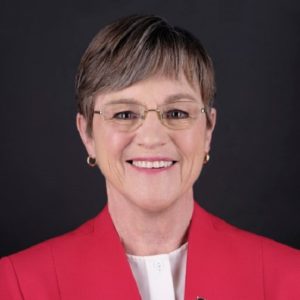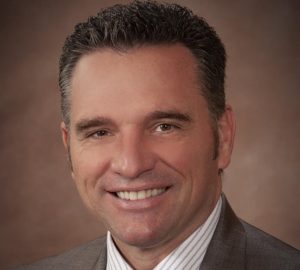(Updated to include reaction from Republican leaders, Kansas Action for Children, chair of governor’s tax reform council and Kansas Chamber with more background)
With reelection right around the corner, Democratic Gov. Laura Kelly on Wednesday morning called for a one-time $250 tax rebate for all Kansans who filed a tax return in 2021.
The governor, who faces a challenge from Republican Attorney General Derek Schmidt next year, is proposing to use historic budget surpluses in excess of $2 billion to pay for the rebates.
Kansas residents who filed as married or jointly will be eligible for a $500 direct payment.
All other filing types will be eligible for a $250 direct payment.
“Since 2019, my administration has carefully worked to get Kansas’ budget back on track after years of mismanagement,” Kelly said in a statement.

“Thanks to our fiscal responsibility and record economic development success, we can return money to taxpayers.”
The governor’s plan, which would benefit more than 1.2 million Kansas taxpayers, would cost $445 million.
Coupled with her proposal to eliminate the sales tax on food, the governor is proposing to spend about $900 million of the $2.89 billion projected nest egg for fiscal year 2022.
“The governor looks forward to working with the legislature to bring these much-needed savings to Kansas families,” Kelly spokeswoman Reeves Oyster said in an email.
House Speaker Ron Ryckman Jr. questioned the sincerity behind the governor’s proposal.
“We’re not opposed to serious opportunities to give Kansans a break on their taxes. But, Kansans are smart, they can see right through Laura Kelly’s attempt to throw $250 their way right before her election,” he said in a statement.
“What our families need is long-term, sustainable tax reform, the kind that Laura Kelly has consistently vetoed,” he said.
Senate President Ty Masterson seemed equally skeptical of the proposal.

“I appreciate Gov. Kelly’s election-year revelation that Kansans are taxed too much,” Masterson said in a statement.
“While I am open to all ideas to help reduce the tax burden on Kansas families, permanent solutions will be our priority,” he said.
Kansas Chamber of Commerce President and CEO Alan Cobb said Kelly seems to be reversing course from comments she made referring to tax cuts proposed in past sessions as “reckless.”
He pointed to comments she made that decoupling from 2017 changes in the federal tax code would undermine the budget.
“Instead, Kansas has collected record tax receipts from hard working Kansans and job creators,” Cobb said.
“We appreciate Gov. Kelly recognizing the tax burden on Kansans is too much.

“But rather than a one-time ‘gift,’ the Kansas business community challenges her and the Kansas Legislature to undertake comprehensive tax reform that will set up our great state and its citizens for long term growth and prosperity,” he said.
The tax rebate proposal was not considered by the governor’s tax reform council, said former Senate President Steve Morris, who cochaired the panel.
Nevertheless, Morris was warm to the idea.
“I’d much rather see that than see a dramatic tax cut that reduces taxes for large multinational corporations and other high stakes individuals,” Morris said.
Kansas Action for Children, which actively engages in tax policy debates, looked at the governor’s proposal positively.
“The governor’s proposal checks a lot of the right boxes,” said John Wilson, president of the organization.
“It’s affordable given current revenue projections. It’s sustainable because it’s a one-time rebate. It’s fair because all filers receive it. And it’s simple to implement,” Wilson said.

“That being said, there are a lot of great things the state can and should address with our current budget surplus, but we can’t do everything,” he said.
“We urge caution as leaders consider this and other tax proposals.
“Tax decisions always need to be weighed against spending decisions, which is why we’re waiting to see if the Legislature will make much-needed long-term investments in kids and working Kansans before we endorse additional tax proposals beyond the elimination of the state sales tax on food.”
Washburn political scientist Bob Beatty said the governor’s proposal strikes in the middle of of the Republican political wheelhouse.
“They should be over the moon,” Beatty said of Republicans.
“This is the type of issue they’ve been championing for years, which is the idea of giving any surpluses back.”
Indeed, Republicans are already considering a constitutional amendment that could limit tax increases or revenues in the future.
“Probably right now, they’re thinking about how they can lead on this issue now that she’s in front of it already,” Beatty said.
But the announcement, Beatty said, puts Kelly ahead of the issue so that even if Republicans reject the idea and pursue other tax measures next session, she would have room to oppose them in favor of her idea.
“This gives Kelly a lot of cover,” Beatty said. “If they do other bills on this subject, she can say, ‘Yeah, my idea is probably the prudent way to go.'”
The governor’s announcement is the latest salvo in a tax tug-of-war between her and Schmidt in the upcoming governor’s race.
Schmidt’s campaign manager accused the governor of borrowing from the Republican playbook.
“Gov. Kelly’s proposed rebate checks today are essentially plagiarized from the GOP tax bill she vetoed a few months ago – except the GOP plan was twice as generous to taxpayers,” CJ Grover said in a statement.
“Between this, proposing a food sales tax cut after vetoing one in 2019, and pretending to oppose vaccine mandates while doing nothing to stop them, the election-year makeover of Laura Kelly’s politics is obviously underway.”
He pointed out that the governor earlier this year vetoed a comprehensive tax bill that provided a $500 across-the-board increase in the standard deduction for all filers.
The law increased the standard deduction to $3,500 for single filers, to $8,000 for married couples and to $6,000 for the head of household.
The standard deduction was part of an overall bill that was estimated to cost the state treasury almost $300 million over three years.
Kelly vetoed the bill, saying it would return the state to an “era of perennial, self-inflicted budget crises that undermine the very fabric and foundation of our state.”
In early November, Schmidt tried to gain the upper hand on Kelly when he announced that he asked Republican leadership to cut the sales tax on food.
Three days later, Kelly reaffirmed her commitment to eliminating the state’s 6.5% sales tax on food when she joined with Democrats at a news conference at Dillons grocery store in Topeka.
The announcement mirrored her 2018 campaign pledge to lower the tax that was featured in campaign ads.
Schmidt criticized Kelly for not moving faster to cut the sales tax on food.
The tax debate also has featured proxy columns written in support of Schmidt and Kelly on the issue of taxes.
Former Senate Minority Leader Anthony Hensley wrote a column for the Topeka Capital-Journal criticizing Schmidt for an “election-year” conversion.
Hensley noted that Schmidt’s Senate voting record revealed that in 2002 he voted to increase the sales tax on food from 4.9% to 5.3%.
The sales tax was scheduled to go down to 5% in 2005, but Schmidt voted to keep the 5.3% in place until July 2006, Hensley wrote.
“As Senate minority leader, I worked with Derek in the Kansas Senate, and he never showed the slightest interest in this issue,” Hensley wrote.
“Even when he was Senate majority leader and could’ve persuaded his fellow Republican senators to cut the food sales tax, he did nothing.”
Former Senate Majority Leader Jim Denning wrote his own piece underscoring Kelly’s record on taxes.
Denning said Hensley seemed “to have a case of selective amnesia,” forgetting about Kelly’s vote on taxes in 2010 as a state senator.
Denning noted that Kelly supported a penny increase in the state sales tax that raised more than $1 billion in taxes as the state emerged from the Great Recession.
“Then along came 2018. Laura Kelly decided to run for governor and lo and behold cutting that grocery tax she had raised just a few years earlier suddenly seemed like a good idea.
“Talk about an election-year conversion,” Denning wrote.















